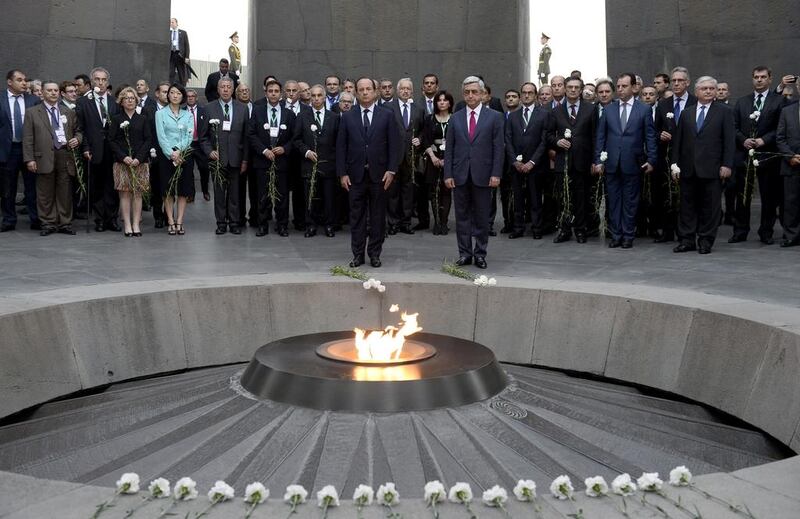We will soon commemorate the 100th anniversary of the Armenian genocide. April 24 is Armenian Remembrance Day, recalling the horrifying events that resulted in the deaths of more than one million Armenians and the forced expulsion and ethnic cleansing of many more from their ancestral homeland at the hands of Turkish nationalists. It is an event that has defined Armenian history. And it has left an open wound that must be acknowledged and addressed for there to be closure for both peoples.
For Armenians, the healing process requires that the events of 100 years ago be called what they were: a genocide.
Six years ago, Armenian Americans were deeply disappointed by the Remembrance Day statement issued by the White House. Barack Obama did not term the horrors of 1915 a genocide. They had great hopes that the president would do so. During his 2008 presidential campaign, he declared that the events of 1915 were a genocide, and criticised those who would not use that word.
Armenian Americans were further encouraged in April 2009, when president Obama urged the Turks to deal with this blot on their history in his address to the Turkish Parliament. By beginning with some of the “darker periods” in US history, he sought to prod his hosts into dealing with their own past.
To be fair, the president’s statement on Armenian Remembrance Day in 2009 was more forceful than any of those by his predecessors. His hesitation about using the term “genocide” was most probably prompted by the fact that the Turkish and Armenian governments had agreed to a “road map” for normalising relations just a couple of days before. He was probably concerned about disrupting this process by provoking a hostile Turkish response.
Thus, the statement the White House issued on April 24, 2009 read, in part: “Ninety-four years ago, one of the great atrocities of the 20th century began. Each year, we pause to remember the 1.5 million Armenians who were subsequently massacred or marched to their death in the final days of the Ottoman Empire.
The Meds Yeghern must live on in our memories, just as it lives on in the hearts of the Armenian people. I have consistently stated my own view of what occurred in 1915, and my view of that history has not changed. My interest remains the achievement of a full, frank and just acknowledgement of the facts. The best way to advance that goal right now is for the Armenian and Turkish people to address the facts of the past as a part of their efforts to move forward. To that end, there has been courageous and important dialogue among Armenians and Turks, and within Turkey itself. I also strongly support the efforts by Turkey and Armenia to normalise their bilateral relations ... the two governments have agreed on a framework and road map for normalisation. I commend this progress, and urge them to fulfil its promise."
In the end, both Turks and Armenians were left angry. The Turks because of the strong language the US president used, and the Armenians because he had failed to deliver on his promise to call the horrors of 1915 a “genocide”.
Six years later, Armenians are still waiting for recognition of their national tragedy so that their healing process can progress. And the Turkish government has remained intransigent, still not coming to grips with the country’s past. The White House is not in an enviable possession. It is engaged in a battle against ISIL and has been pushing the Turks to “step up their game” as part of the international coalition fighting this evil movement. I must admit that, although I understand the demands of politics and diplomacy, I am also acutely aware of the demands of history that cry out for recognition.
On a personal note, I was struck by how, this past week, Deir Yassin day passed almost unnoticed. It was that day, April 9, that marks the 1948 massacre of over 200 Palestinian civilians in the small village of Deir Yassin. They were slaughtered and many of the dead were stuffed into a well and left to rot.
It was one of the many horrors that accompanied the Nakba, the name given to the programme of ethnic cleansing that left thousands of Palestinians dead, and forced hundreds of thousands more into exile.
It is wrong to tell victim nations to “just get over it”. For there to be reconciliation, there must be acknowledgement and justice. Just as we demand that Israel acknowledge and make recompense for its original sin, we can want no less for the Armenian people.
James Zogby is the president of the Arab American Institute
On Twitter: @aaiusa





